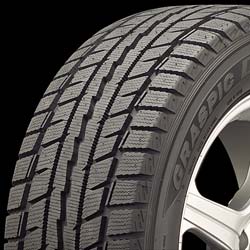Ditto. Front wheel drive with 4 good snow tires is a great option. I commuted 40 miles each way to work for almost 10 years with two different Honda Civics, and I ran 4 snows on them in the winter time and never had any problems.Dr. NO wrote:If you are going 2 wheel drive, put the 4 snow tires on. Lots of good ones out there, but don't skimp if you plan on driving in snow country. Throw a bit of extra weight in the trunk to maintain rear stability for front wheel drive.
snow vs. winter tires
Moderators: SkiDork, spanky, Bubba
- lifeisgood
- Bumper
- Posts: 556
- Joined: Nov 8th, '04, 11:18
- Location: Northwest NJ
Do what you like.
Like what you do.
Like what you do.
- Stormchaser
- Level 10K poster
- Posts: 14087
- Joined: Nov 4th, '04, 22:32
- Location: Hot tub
Definitely the narrower the better for snows. You could probably go as low as a 195 or so (and should be a lot cheaper). What is the narrowest tire they make in a 16" rim?
EDIT: BTW, I run 4 Cooper M+S's (mud and snow) on my Jeep. Never been stuck once, including driving down unplowed roads with 18" of new snow on them...
EDIT: BTW, I run 4 Cooper M+S's (mud and snow) on my Jeep. Never been stuck once, including driving down unplowed roads with 18" of new snow on them...
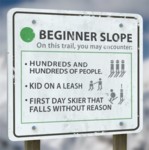
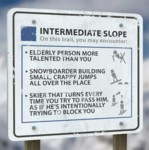
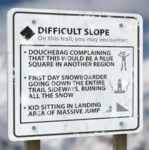
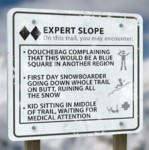
Bridgestone Dueler AT Revos..
255/70/17....on my Jeep...that's how I roll.
http://www.tirerack.com/tires/tires.jsp ... r+A/T+Revo
255/70/17....on my Jeep...that's how I roll.
http://www.tirerack.com/tires/tires.jsp ... r+A/T+Revo
A few points:
* Going narrower is good. Wide tires want to hydroplane on slush. It makes a big difference on relatively light FWD cars. Less of a difference on a heavier car.
* If you have alloy wheels, going down an inch on steel rims is good since you have more sidewall to absorb the impact of pot holes. The tires are also cheaper. My VW has 16" alloy rims in the summer and 15" steel rims in the winter. My SUV runs 17" wheels in the summer and 16" wheels in the winter. You can usually find the smaller wheel size for most cars used for cheap since people like to upgrade to bigger alloy wheels with low aspect ratio. Look at eBay, Craigs List, and message boards for "enthusiasts" for your brand of car. You can always find a 17-year-old kid who just upgraded his crappy 15" steel wheels for 17" low profile alloys while installing the huge chrome exhaust tip and blue neon windshield washer lights.
* You want the same tire circumference or your speedometer will read wrong. There are lots of online tire calulators that will work it out for you.
A Google on "tire calculator" points you to:
http://www.miata.net/garage/tirecalc.html
* If you do any flatland driving, you don't want studded tires. I have them on the SUV and it sounds like farm equipment. A good quality friction tire is the way to go for a typical front wheel drive car. Nokian RSI, Bridestone Blizzak, Michelin X-Ice are examples. The tires have tons of little siping cuts in them to displace the water layer. That makes them perform well on black ice which is the big winter driving problem in the Northeast. You can probably find the Michelin X-Ice at big box wholesale stores. A 195/65R15 will run less than $100 and the big box stores typically offer free mounting and free tire rotation that you can use to swap your winter & summer setups.
* An SUV is of practically no use in northeastern snow driving unless you put good snow tires on it. We never get enough snow where ground clearance would matter. The suckers are heavy so they brake and corner terribly on stock tires. That's why you see them upside-down in the median strip every snow storm. If I didn't need to tow a 5,000+ pound boat & trailer, there's no way I'd own an SUV. I'd buy a lawn & garden trailer and put a receiver hitch on my car instead. A FWD car with good snow tires will have no problem making it up the problem places at Killington like the Bear Access Road, West Hill Road, or Anthony Way and certainly won't have problems on the Sherburne Pass and the Access Road.
* I usually try to hold off swapping on my snow tires until mid-December. They're on separate rims so I can get them installed quickly if I see snow in the forecast. I try to get them off by April 1. Snow tires wear like crazy in warm weather and I can get several extra seasons out of them this way. Last year, I never even bothered putting the snow tires on the VW and they didn't go on the Mountaineer until Xmas week.
* Going narrower is good. Wide tires want to hydroplane on slush. It makes a big difference on relatively light FWD cars. Less of a difference on a heavier car.
* If you have alloy wheels, going down an inch on steel rims is good since you have more sidewall to absorb the impact of pot holes. The tires are also cheaper. My VW has 16" alloy rims in the summer and 15" steel rims in the winter. My SUV runs 17" wheels in the summer and 16" wheels in the winter. You can usually find the smaller wheel size for most cars used for cheap since people like to upgrade to bigger alloy wheels with low aspect ratio. Look at eBay, Craigs List, and message boards for "enthusiasts" for your brand of car. You can always find a 17-year-old kid who just upgraded his crappy 15" steel wheels for 17" low profile alloys while installing the huge chrome exhaust tip and blue neon windshield washer lights.
* You want the same tire circumference or your speedometer will read wrong. There are lots of online tire calulators that will work it out for you.
A Google on "tire calculator" points you to:
http://www.miata.net/garage/tirecalc.html
* If you do any flatland driving, you don't want studded tires. I have them on the SUV and it sounds like farm equipment. A good quality friction tire is the way to go for a typical front wheel drive car. Nokian RSI, Bridestone Blizzak, Michelin X-Ice are examples. The tires have tons of little siping cuts in them to displace the water layer. That makes them perform well on black ice which is the big winter driving problem in the Northeast. You can probably find the Michelin X-Ice at big box wholesale stores. A 195/65R15 will run less than $100 and the big box stores typically offer free mounting and free tire rotation that you can use to swap your winter & summer setups.
* An SUV is of practically no use in northeastern snow driving unless you put good snow tires on it. We never get enough snow where ground clearance would matter. The suckers are heavy so they brake and corner terribly on stock tires. That's why you see them upside-down in the median strip every snow storm. If I didn't need to tow a 5,000+ pound boat & trailer, there's no way I'd own an SUV. I'd buy a lawn & garden trailer and put a receiver hitch on my car instead. A FWD car with good snow tires will have no problem making it up the problem places at Killington like the Bear Access Road, West Hill Road, or Anthony Way and certainly won't have problems on the Sherburne Pass and the Access Road.
* I usually try to hold off swapping on my snow tires until mid-December. They're on separate rims so I can get them installed quickly if I see snow in the forecast. I try to get them off by April 1. Snow tires wear like crazy in warm weather and I can get several extra seasons out of them this way. Last year, I never even bothered putting the snow tires on the VW and they didn't go on the Mountaineer until Xmas week.
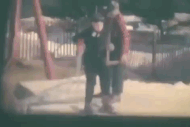
Geoff is da man when it comes to winter tires... Amazing that he didn't cut and paste this...Geoff wrote:A few points:
* Going narrower is good. Wide tires want to hydroplane on slush. It makes a big difference on relatively light FWD cars. Less of a difference on a heavier car.
* If you have alloy wheels, going down an inch on steel rims is good since you have more sidewall to absorb the impact of pot holes. The tires are also cheaper. My VW has 16" alloy rims in the summer and 15" steel rims in the winter. My SUV runs 17" wheels in the summer and 16" wheels in the winter. You can usually find the smaller wheel size for most cars used for cheap since people like to upgrade to bigger alloy wheels with low aspect ratio. Look at eBay, Craigs List, and message boards for "enthusiasts" for your brand of car. You can always find a 17-year-old kid who just upgraded his crappy 15" steel wheels for 17" low profile alloys while installing the huge chrome exhaust tip and blue neon windshield washer lights.
* You want the same tire circumference or your speedometer will read wrong. There are lots of online tire calulators that will work it out for you.
A Google on "tire calculator" points you to:
http://www.miata.net/garage/tirecalc.html
* If you do any flatland driving, you don't want studded tires. I have them on the SUV and it sounds like farm equipment. A good quality friction tire is the way to go for a typical front wheel drive car. Nokian RSI, Bridestone Blizzak, Michelin X-Ice are examples. The tires have tons of little siping cuts in them to displace the water layer. That makes them perform well on black ice which is the big winter driving problem in the Northeast. You can probably find the Michelin X-Ice at big box wholesale stores. A 195/65R15 will run less than $100 and the big box stores typically offer free mounting and free tire rotation that you can use to swap your winter & summer setups.
* An SUV is of practically no use in northeastern snow driving unless you put good snow tires on it. We never get enough snow where ground clearance would matter. The suckers are heavy so they brake and corner terribly on stock tires. That's why you see them upside-down in the median strip every snow storm. If I didn't need to tow a 5,000+ pound boat & trailer, there's no way I'd own an SUV. I'd buy a lawn & garden trailer and put a receiver hitch on my car instead. A FWD car with good snow tires will have no problem making it up the problem places at Killington like the Bear Access Road, West Hill Road, or Anthony Way and certainly won't have problems on the Sherburne Pass and the Access Road.
* I usually try to hold off swapping on my snow tires until mid-December. They're on separate rims so I can get them installed quickly if I see snow in the forecast. I try to get them off by April 1. Snow tires wear like crazy in warm weather and I can get several extra seasons out of them this way. Last year, I never even bothered putting the snow tires on the VW and they didn't go on the Mountaineer until Xmas week.
Well, in that case, I come really close with a hakkapeliitta SUV - 215/70R16 - accomodates my 7" rim width (barely), and has only a 0.6% difference in speedometer rating.
The only problem is the load index is only 100 (1764lbs), vs. 104 (1984lbs) on my stock tires.
I'd like to stick with stock wheels (pick 'em up from a junkyard), which only come in 16" on my car.
stock tires, again, are 235/65R 16.
The only problem is the load index is only 100 (1764lbs), vs. 104 (1984lbs) on my stock tires.
I'd like to stick with stock wheels (pick 'em up from a junkyard), which only come in 16" on my car.
stock tires, again, are 235/65R 16.
That's what I have on my 4Runner, love those tires. Radical thread on em.SPORE wrote:Bridgestone Dueler AT Revos..
255/70/17....on my Jeep...that's how I roll.
http://www.tirerack.com/tires/tires.jsp ... r+A/T+Revo
I run the Hakkeepolita RSIs on an AWD Audi, and I use seperate rims. They are 1 inch smaller than the rims I run the high performance tires on.
I got rid of my SUV last month, but I ran Hakkes on that, two. THe car with the Hakkes is infinitely better handling than the SUV.
Geoff is right about ground clearance for SNOW in New England (if it is so deep that your car bottoms out--you won't be maing it in the 100 year blizzard no matter what youa re driving--the plows won't even be out until it's done).
However, the SUV did have an advantage on severely rutted dirt roads. It can be realy easy to brak things nder a low clearance car when the roads melt, rut and then refreeze. You'd expect that in the spring, but it hapens all year round in New England. Still--car is better for the hours you drive up vs the minutes you climb the dirt road to your house. You just have to be extra careful to avoid the ruts.
I got rid of my SUV last month, but I ran Hakkes on that, two. THe car with the Hakkes is infinitely better handling than the SUV.
Geoff is right about ground clearance for SNOW in New England (if it is so deep that your car bottoms out--you won't be maing it in the 100 year blizzard no matter what youa re driving--the plows won't even be out until it's done).
However, the SUV did have an advantage on severely rutted dirt roads. It can be realy easy to brak things nder a low clearance car when the roads melt, rut and then refreeze. You'd expect that in the spring, but it hapens all year round in New England. Still--car is better for the hours you drive up vs the minutes you climb the dirt road to your house. You just have to be extra careful to avoid the ruts.
Beg to differ on the Ground Clearance for a storm. With the SUV, it is usually not a problem, unless your limited slip screws you and digs you in. But, a Subaru or AWD car vs. a high SUV is limited if the snow is over 12 inches. One such storm was over 25 inches and the JEEP still managed to plow through it. Subaru never even got started, and the Explorers had that dam dig in problem.
MUST STOP POSTING ! MUST STOP POSTING !
Shut up and Ski!
Why's Everybody Always Pickin on Me?
Shut up and Ski!
Why's Everybody Always Pickin on Me?
Bridge stone Snow Tires
Like Dr. No does, I run 4 snow tires, but I use Bridgestones on my escort. Yes, they really help alot.
Gee. Where I own property, they actually plow the roads. I don't think I've ever seen a road in the east with more than 12" of snow on it. Maybe you should move?Dr. NO wrote:Beg to differ on the Ground Clearance for a storm. With the SUV, it is usually not a problem, unless your limited slip screws you and digs you in. But, a Subaru or AWD car vs. a high SUV is limited if the snow is over 12 inches. One such storm was over 25 inches and the JEEP still managed to plow through it. Subaru never even got started, and the Explorers had that dam dig in problem.
I do have a few days every spring where my Kmart driveway is an issue. Some neighbor in J-building has a massive Chevy Suburban eco-disaster that creates huge ruts. Right Dork?
TheBullet has it right... an SUV is indeed useful during mud month. ...but that has nothing to do with snow performance.

Michelin makes a truck/SUV version of their X-Ice called the Lattitude that is much cheaper than the Hakka SUV. I'm not sure I'd trust their reviews since they hate cars but Consumer Reports gave the X-Ice their highest marks last year.Steve wrote:Well, in that case, I come really close with a hakkapeliitta SUV - 215/70R16 - accomodates my 7" rim width (barely), and has only a 0.6% difference in speedometer rating.
The only problem is the load index is only 100 (1764lbs), vs. 104 (1984lbs) on my stock tires.
I'd like to stick with stock wheels (pick 'em up from a junkyard), which only come in 16" on my car.
stock tires, again, are 235/65R 16.
You can get a 215/70QR16 at tirerack.com for $93 and Costco & BJ's Wholesale probably carry it at a similar price and thow in free mounting and lifetime tire roation. It also has a 100 load rating but that shouldn't be an issue unless you are driving with me & Dork in the back seat and 20 cases of beer in the trunk. You can drive 80 mph all day with a Q-rated tire.

I'm in for a new set of tires soon. I'm thinking of going with Geoffs suggestion on the smaller rims and a set of hakkas (non-studded) for thw winter months, then get a new set of regular sneakers for the rest of the year.
Actually, every time I come up the driveway at Glazebroook and do a few burnouts in the mud with a big grin on my face thinking about Geoff!
;-)
Actually, every time I come up the driveway at Glazebroook and do a few burnouts in the mud with a big grin on my face thinking about Geoff!
;-)
